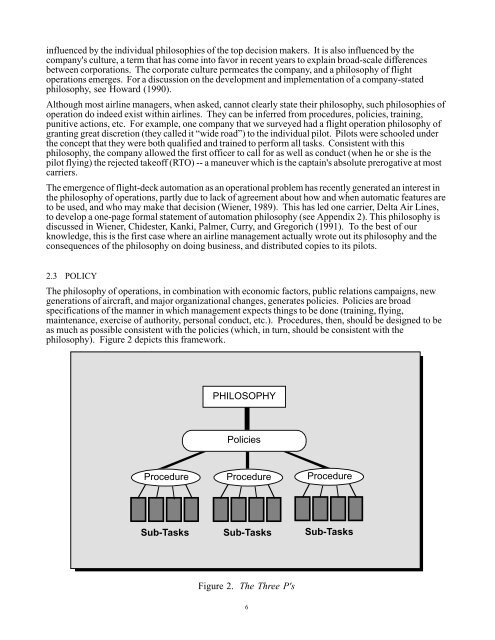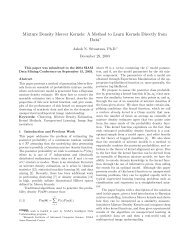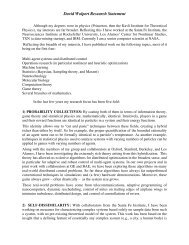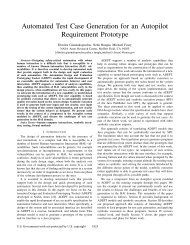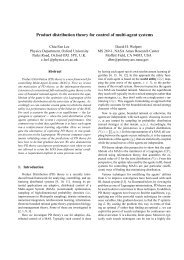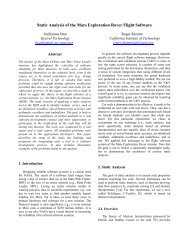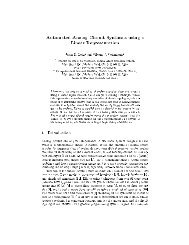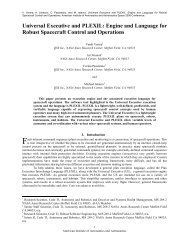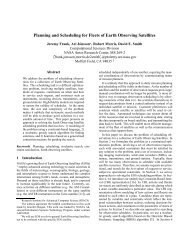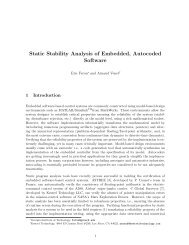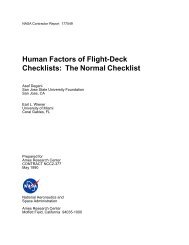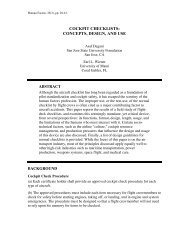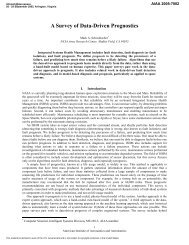influenced by <strong>the</strong> individual philosophies <strong>of</strong> <strong>the</strong> top decision makers. It is also influenced by <strong>the</strong>company's culture, a term that has come into favor in recent years to explain broad-scale differencesbetween corporations. The corporate culture permeates <strong>the</strong> company, and a philosophy <strong>of</strong> flightoperations emerges. For a discussion on <strong>the</strong> development and implementation <strong>of</strong> a company-statedphilosophy, see Howard (1990).Although most airline managers, when asked, cannot clearly state <strong>the</strong>ir philosophy, such philosophies <strong>of</strong>operation do indeed exist within airlines. They can be inferred from procedures, policies, training,punitive actions, etc. For example, one company that we surveyed had a flight operation philosophy <strong>of</strong>granting great discretion (<strong>the</strong>y called it “wide road”) to <strong>the</strong> individual pilot. Pilots were schooled under<strong>the</strong> concept that <strong>the</strong>y were both qualified and trained to perform all tasks. Consistent with thisphilosophy, <strong>the</strong> company allowed <strong>the</strong> first <strong>of</strong>ficer to call for as well as conduct (when he or she is <strong>the</strong>pilot flying) <strong>the</strong> rejected take<strong>of</strong>f (RTO) -- a maneuver which is <strong>the</strong> captain's absolute prerogative at mostcarriers.The emergence <strong>of</strong> flight-deck automation as an operational problem has recently generated an interest in<strong>the</strong> philosophy <strong>of</strong> operations, partly due to lack <strong>of</strong> agreement about how and when automatic features areto be used, and who may make that decision (Wiener, 1989). This has led one carrier, Delta Air Lines,to develop a one-page formal statement <strong>of</strong> automation philosophy (see Appendix 2). This philosophy isdiscussed in Wiener, Chidester, Kanki, Palmer, Curry, and Gregorich (1991). To <strong>the</strong> best <strong>of</strong> ourknowledge, this is <strong>the</strong> first case where an airline management actually wrote out its philosophy and <strong>the</strong>consequences <strong>of</strong> <strong>the</strong> philosophy on doing business, and distributed copies to its pilots.2.3 POLICYThe philosophy <strong>of</strong> operations, in combination with economic factors, public relations campaigns, newgenerations <strong>of</strong> aircraft, and major organizational changes, generates policies. Policies are broadspecifications <strong>of</strong> <strong>the</strong> manner in which management expects things to be done (training, flying,maintenance, exercise <strong>of</strong> authority, personal conduct, etc.). <strong>Procedures</strong>, <strong>the</strong>n, should be designed to beas much as possible consistent with <strong>the</strong> policies (which, in turn, should be consistent with <strong>the</strong>philosophy). Figure 2 depicts this framework.PHILOSOPHYPoliciesProcedureProcedureProcedureSub-TasksSub-TasksSub-TasksFigure 2. The Three P's6
The levels in <strong>the</strong> Three-P framework are not rigid. For some aspects <strong>of</strong> flight operations <strong>the</strong>re may beseveral policies, for o<strong>the</strong>rs <strong>the</strong>re may be only a philosophy. For example, checklist SOP is a matureaspect <strong>of</strong> flight operation: <strong>the</strong>re can be an overall checklist philosophy, checklist policies for normal,abnormal, and emergency situations. <strong>Flight</strong>-deck automation is still in an immature stage <strong>of</strong>development. As <strong>the</strong> operation matures, policies will be defined and added, and philosophies maychange 2 .To illustrate <strong>the</strong> Three P's, let us assume that <strong>the</strong> task at hand is <strong>the</strong> configuration <strong>of</strong> an advancedtechnology aircraft for a Category-I ILS approach:1. Philosophy: Automation is just ano<strong>the</strong>r tool to help <strong>the</strong> pilot.2. Policy: Use or non-use <strong>of</strong> automatic features (within reason) is at <strong>the</strong> discretion <strong>of</strong> <strong>the</strong> crew.3. Procedure: <strong>On</strong> a Category-I approach, <strong>the</strong> flight crew will first decide what level <strong>of</strong> automationto use (hand-fly with flight director; autopilot and mode control panel; coupled; etc.), whichdetermines what must be done to configure <strong>the</strong> cockpit.4. Sub-tasks (or actions): Follow from procedures (e.g., tune and identify localizer and compasslocator, set decision height, select autopilot mode, etc.)In some cases, policies that are actually remote from flight operations can affect procedures. <strong>On</strong>ecarrier's new public relations policy called for more interaction between <strong>the</strong> cockpit crew and <strong>the</strong>passengers. It was recommended that at each destination <strong>the</strong> captain stand at <strong>the</strong> cockpit door and makefarewells to <strong>the</strong> passengers as <strong>the</strong>y departed <strong>the</strong> cabin. In particular, <strong>the</strong> marketing department wanted<strong>the</strong> pilot to be in place at <strong>the</strong> cockpit door in time to greet <strong>the</strong> disembarking first-class passengers. Thisdictated a procedural change in that most <strong>of</strong> <strong>the</strong> SECURE-AIRCRAFTchecklist had to be done alone by <strong>the</strong>first <strong>of</strong>ficer. Thus checklist procedures which would normally be run by both pilots, probably as achallenge-and-response, were performed by a single pilot in deference to public relations imperatives.To conclude, it is our position that procedures should be based on <strong>the</strong> operational concepts <strong>of</strong> <strong>the</strong>organization. We hypo<strong>the</strong>size that if <strong>the</strong>se operational concepts are specified (in writing) as a philosophyand a set <strong>of</strong> policies, <strong>the</strong>n (1) a logical and consistent set <strong>of</strong> cockpit procedures that are in accord with <strong>the</strong>policies and philosophy can be generated, (2) discrepancies and conflicting procedures will be easilydetected, and (3) flight crews will be aware <strong>of</strong> <strong>the</strong> logic behind every SOP 3 . We also hypo<strong>the</strong>size that all<strong>of</strong> <strong>the</strong> above will lead to a higher degree <strong>of</strong> conformity to procedures during line operations. In addition,flight training, transition training, and line and FAA checking will be made easier, and <strong>the</strong> general quality<strong>of</strong> flight operations will be enhanced.To design procedures, even in <strong>the</strong> manner that we have recommended, does not ensure perfectconformity by line crews. In <strong>the</strong> next chapter we will explore <strong>the</strong> actual practices as conducted on <strong>the</strong>line, and <strong>the</strong> reasons for non-conformity to standard operating procedures. This discussion extends <strong>the</strong>development <strong>of</strong> <strong>the</strong> model to <strong>the</strong> fourth "P" - practices. An all- inclusive model, linking <strong>the</strong> four P's toline operations will be developed, and <strong>the</strong> role <strong>of</strong> feedback from line to management will be discussed.2 Rosenbrock (1990), makes a somewhat similar distinction between purpose, policy, and schedule, from a view point <strong>of</strong>a control <strong>the</strong>orist.3 For a practical example detailing <strong>the</strong> benefits <strong>of</strong> specifying policies prior to making technical decisions, see Hammondand Adelman (1976).7
- Page 2 and 3: TABLE OF CONTENTSSUMMARY ..........
- Page 4 and 5: 1. INTRODUCTIONWhen we try to pick
- Page 6 and 7: Hendrick (1987) states that human f
- Page 10 and 11: 3. THE FOURTH P: PRACTICES3.1. AN E
- Page 12 and 13: To summarize, the ultimate factor t
- Page 14 and 15: Humor. Humor is closely related to
- Page 16 and 17: technical deficiencies, induce work
- Page 18 and 19: operations and the philosophy of th
- Page 20 and 21: 5.3 MERGERS AND ACQUISITIONSMergers
- Page 22 and 23: Figure 7. A Boeing B-757 checklist
- Page 24 and 25: e made. Consider, also, the followi
- Page 26 and 27: flight operations, the philosophy m
- Page 28 and 29: 5.7.3 Technique and PoliciesAny giv
- Page 30 and 31: For example, one company constantly
- Page 32 and 33: 6. ISSUES IN PROCEDURE DESIGN6.1 CO
- Page 34 and 35: solution involves “anchoring” a
- Page 36 and 37: On August 19, 1980, a Saudi Arabian
- Page 38 and 39: 3. The procedures allow the other a
- Page 40 and 41: coordination of tasks between agent
- Page 42 and 43: Similarly, it has been a common pra
- Page 44 and 45: 7.1.3 Structure of ProceduresAs men
- Page 46 and 47: mission simulation (see Wiener et a
- Page 48 and 49: felt that this is an efficient tech
- Page 50 and 51: esponse. The PF, therefore, can con
- Page 52 and 53: 7.5.1 Cross-fleet StandardizationCr
- Page 54 and 55: 1. Training department (for both pi
- Page 56 and 57: REFERENCESAviation Week and Space T
- Page 58 and 59:
Perrow, C. (1986). Complex organiza
- Page 60 and 61:
APPENDICESAppendix 1 - Guidelines f
- Page 62 and 63:
14. In managing automated cockpits,
- Page 64 and 65:
APPENDIX 3 - QUESTIONS ASKED OF FLI
- Page 66 and 67:
APPENDIX 5 - QUESTIONS ASKED DURING
- Page 68 and 69:
8. Change in operational environmen


